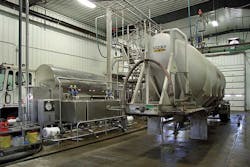Wichita expansion comes up a winner for Sani-Kleen Tank Wash Inc
OPEN FOR about a year and a half, the newest Sani-Kleen Tank Wash Inc facility in North Wichita, Kansas has been a resounding success. Located near exit 14 off interstate 135, the wash rack officially opened in October 2012.
Built on three acres, the four-bay wash rack offers foodgrade and non-foodgrade cleaning. The edibles cleaning bays offer Kosher-certified washes. In addition, the facility is Cargill-certified for salt and oilseed, as well as being Interstate Milk Shippers approved for cleaning dairy tankers.
This is the first of the three locations built by the Mt Vernon, Missouri-based commercial wash rack operator to include offices and a maintenance shop for a fleet customer. The two-bay shop was built specifically for Foodliner Inc.
“We combined all of the good things from our other two wash racks in Mt Vernon and Joplin, Missouri into this location, and it has been a success from the very start,” says Scott Cloud, president and co-owner of Sani-Kleen Tank Wash Inc. “This is an efficient, state-of-the-art facility that can clean a wide range of products.
“Building a wash rack in Wichita was a strategic decision based on customer demand. We are growth oriented, but we are looking for opportunities to work with specific customers that can generate adequate cleaning volume.”
Cleaning schedule
Sani-Kleen’s Wichita-area wash rack can clean about 20 trailers a day with its current crew of five tank cleaners who keep the facility open from 7 am to 7 pm Monday through Friday. Saturday cleanings are available by appointment.
Foodgrade products cleaned at the wash rack include sweeteners, edible oils, salt, and flour. On the non-edible side, the wash rack can handle products such as latex and certain resins. Some hazardous products are cleaned at the wash rack.
The Wichita tank wash facility offers four cleaning bays—two for edibles and two for inedible products. “The edible cleaning system is a proprietary design that was born out of 17 years of experience in the tank wash industry,” says Rick Johnson, Sani-Kleen vice-president and co-owner. “The wash results from our system are unparalleled in the industry, and it would appear our customers agree with us.”
Dry bulkers used to transport salt and flour are the primary focus of the in-house designed and built vat-style wash system in one of the two edible bays. The low-pressure/high-volume wash system ensures 180°F sanitize cycles at discharge for the dry bulkers. Foodgrade cleaning is largely automated with pre-programmed wash menus that help ensure consistent washes.
Hot water for edibles cleaning also is supplied by a Kelton unit, and detergent can be injected during cleaning with that machine. All of the foodgrade cleaning is done with Sellers spinners.
A second Kelton unit serves the two bays that handle inedibles. Cleaning of inedibles is a manual process because there are too many variable, according to Cloud.
Spraying Systems Inc spinners are used in both bays. Steam for all of the cleaning bays comes from a 60-horsepower Superior boiler.
Filtered water
Water used in cleaning operations is filtered through five micron filters to help prevent any chance of contamination. The forced-air system for drying clean trailers has a 43-micron filter for treating the ambient temperature air.
After cleaning, workers thoroughly inspect the interior of every trailer. As needed, workers will enter tanks to scrape out edibles such as chocolate or inedibles such as latex.
“Confined space safety is a critical part of the 90-day training program we put all of our new hired through. Most of these workers come in with no tank cleaning experience, and we have to train them from the ground up.”
Wastewater from the cleaning process goes through an in-ground pretreatment system with a series of concrete traps that filter out oils and grease. Wastewater is pH balanced before being shipped away for disposal. Heels also are taken away for disposal after being captured before cleaning.
Metal building
Cleaning operations are housed in a metal building surrounded by a fully paved parking area. The mezzanine in the edibles bays was fabricated from stainless steel. Virtually every surface is cleanable to help eliminate any possibility that clean trailers might be contaminated.
Sani-Kleen adopted a biosecurity policy and implementation plan in 2013 to help ensure the security of foodgrade tanks that are cleaned at the facility. “Our policy is designed to ensure the security of our facilities and the quality of our wash procedures,” Johnson says. “It is our desire to do our part to protect our nation’s food supply and our food transportation system.”
Access is controlled, and customers are required to drop trailers for cleaning in an area designated as the “dirty line.” Customer trucks are not allowed in the wash bays at any time. Security cameras monitor every part of the facility, and the live feed is monitored at the Sani-Kleen home office in Mt Vernon.
While security is a concern, the company also tries to make a truck driver’s time at the Wichita wash rack as comfortable as possible. Driver features include fresh hotdogs and coffee in the driver lounge. Separate and individuals showers and restrooms for men and women are kept supplied with fresh towels and are cleaned daily. Nearby restaurants give drivers plenty of options for meals.
“This almost certainly won’t be the last new wash rack we’ll build,” Cloud says. “We see more promising opportunities coming up, even as early as this fall.” ♦

